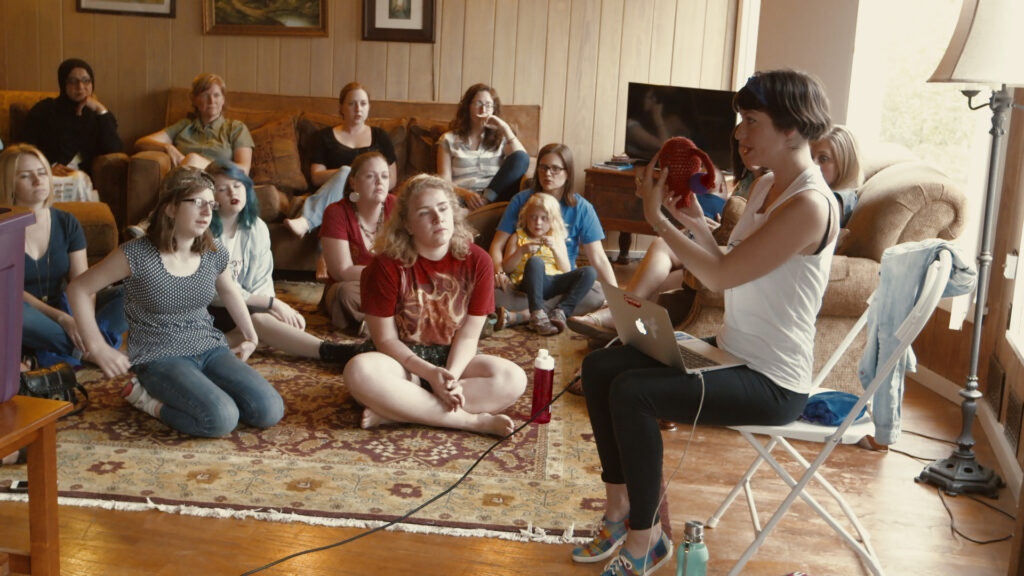Abby Epstein started her career as a theater director having her own Chicago-based production company, Roadworks Productions, which was founded in 1992. After directing a few productions in Chicago, Epstein moved to New York to be an assistant director on the production of “Rent.” She then worked on “The Vagina Monologues” with Eve Ensler and directed her first film, 2003’s “Until the Violence Stops,” a documentary about the impact of “The Vagina Monologues” on a global scale. Her other film credits include “The Business of Being Born” and “Weed the People.”
“The Business of Birth Control” starts screening at the 2021 DOC NYC Film Festival on November 14. The fest runs from November 10-28.
W&H: Describe the film for us in your own words.
AE: The movie takes a hard look at the lack of options and informed consent around hormonal birth control.
It traces the racist roots of contraception, the role of the feminist health movement in raising awareness about side effects, the personal stories of those who have suffered, and how people with uteruses are innovating and taking back control of their bodies.
W&H: What drew you to this story?
AE: Author Holly Grigg-Spall gave me her then unpublished manuscript called “Sweetening the Pill” in the hopes of turning it into a documentary. Having my own negative experiences with the pill, I was blown away by all that I didn’t know about a medication that I took daily for almost a decade.
I soon realized that most women, trans, and non-binary folks shared a frustration around this lack of informed consent and that there was a truth and reckoning that needed to happen around this issue.
W&H: What do you want people to think about after they watch the film?
AE: Generations of people were raised without basic body literacy and it’s still common for folks not to understand how their bodies work until they are trying to get pregnant.
This idea that women must medicate themselves daily with an endocrine-disrupting chemical in order to manage their fertility is not aligning with younger generations. It’s clear that we need massive education and innovation around fertility management and reproductive health.
W&H: What was the biggest challenge in making the film?
AE: The biggest challenge was that it’s impossible to film “side effects.” There are not many ways to capture visually or narratively how these products impact the mind and the body.
W&H: How did you get your film funded? Share some insights into how you got the film made.
AE: Our film was funded 80% by crowdfunding on Kickstarter and private donations. The other 20% was funded by investors.
W&H: What inspired you to become a filmmaker?
AE: I was a theater director right out of college and worked steadily on and Off-Broadway. I directed “The Vagina Monologues” and worked on the V-Day Movement to end violence against women and girls, which became the subject of my first film. I was inspired by wanting to tell the story in a viral way more than the idea of becoming a filmmaker.
W&H: What’s the best and worst advice you’ve received?
AE: I’m not sure. I guess I don’t listen to many people.
W&H: What advice do you have for other women directors?
AE: I would advise them to lean on each other and to keep giving back. I spend a huge amount of time making myself of service to aspiring women filmmakers, mentoring them, and guiding their projects.
W&H: Name your favorite woman-directed film and why.
AE: Every film by Ava DuVernay.
W&H: How are you adjusting to life during the COVID-19 pandemic? Are you keeping creative, and if so, how?
AE: As a single mom of two school-age children, I did not stay very creative during the COVID-19 shutdown and pandemic. It was day-to-day survival. I did watch more films than usual, so I guess that was inspiring to be able to see more people’s work.
W&H: The film industry has a long history of underrepresenting people of color on screen and behind the scenes and reinforcing— and creating— negative stereotypes. What actions do you think need to be taken to make the doc world more inclusive?
AE: I think we all need to work at this from the ground up, creating more opportunities for inclusivity on our projects behind the scenes and in our storytelling. It’s important that the doc industry allocates funding to these underrepresented voices as well.







